loosecannon
Senior Member
- May 7, 2007
- 4,888
- 269
- 48
The same thing happened in 2002-2008, Reverse.
And I don't think you can so easily discount the hundreds of billions that have flowed into the stock market because of the 401K tax shelters.
That legislation alone might be responsible for the stock market being overvalued by 50%.
And I don't think you can so easily discount the hundreds of billions that have flowed into the stock market because of the 401K tax shelters.
That legislation alone might be responsible for the stock market being overvalued by 50%.


